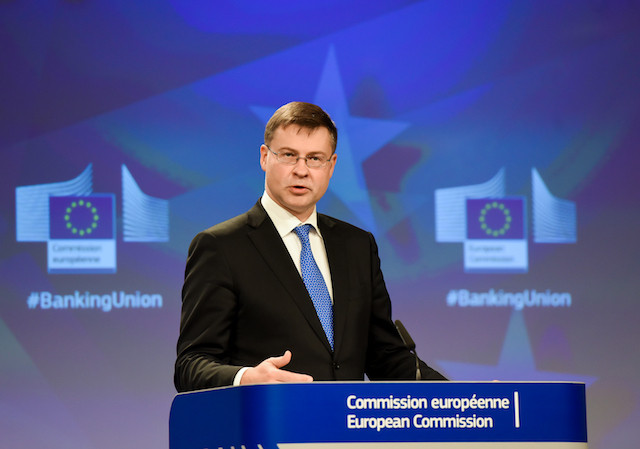The commission has published several proposals to complete the banking union over the past years. However, “progress is slow”, because the European Council and the European Parliament are at odds over some measures, Valdis Dombrovskis said in a press announcement.
The European commissioner for the euro, financial services and capital markets union presented some “pragmatic ideas to speed up the process by advancing in parallel on risk-reduction and risk-sharing measures.”
He called on the two institutions to adopt the comprehensive risk-reduction measures already presented in the November 2016 banking package. These measures will strengthen and adjust the existing rules to complete the post-crisis regulatory agenda for banks.
He also called for a “consensus on a European Deposit Insurance Scheme, or EDIS. As you know, the Commission proposed EDIS as a Europe-wide system building on the existing Deposit Guarantee Scheme directive.”
The EDIS would collect funds from banks--and only banks--to build up a strong Europe-wide deposit guarantee of €100 000 per depositor. This would help break the bank-sovereign link by making deposit protection independent of a bank's location, according to the press release.
However, because of the disagreements between the EP and the European Council, the commission has proposed new ideas to unblock the discussions by introducing EDIS in a more gradual manner:
“One suggestion would be to limit EDIS in its first phase to providing loans to depleted national schemes. These loans would later have to be fully paid back. In other words, EDIS would not cover losses. It would focus on providing liquidity, to ensure that depositors maintain quick access to their savings.
Another idea would be to make the second phase of EDISconditional on an asset quality review. In other words, a health-check of our banks to confirm that legacy issues from the crisis have been dealt with. Here, our European level strategy to reduce non-performing loanswould play an important role.”
Dombrovskis called also for “a common backstop to the Banking Union to become operational as quickly as possible.” As a last-resort tool, this backstop would only intervene after private creditors have born losses.
He added that support emerged in Monday's Eurogroup meeting that “the European Stability Mechanism could provide that backstop for the single resolution fund”, and that the commission will follow this up in December.
The European commissioner said that they were:
“exploring pragmatic solutions for helping banks diversify their holdings of sovereign bonds. This would further weaken the bank-sovereign link. In this context, we are closely following the work of the European Systemic Risk Board on sovereign bond backed securities. This would be a product created by market participants, which banks could choose to hold.”
